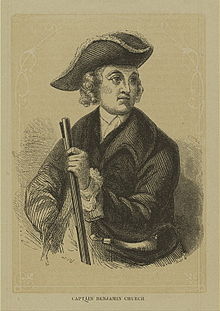
Back بنجامين تشرتش Arabic بنجامين تشرتش ARZ Benjamin Church (militaire) French Benjamin Church (militare) Italian ベンジャミン・チャーチ Japanese Beniaminus Church (praefectus militaris) Latin Benjamin Church (oberst) NB Benjamin Church Polish 班傑明·丘奇 Chinese
Benjamin Church | |
|---|---|
 A posthumous illustration of Church | |
| Born | c. 1639 |
| Died | 17 January 1718 (aged 78–79) |
| Military career | |
| Allegiance | New England Colonies |
| Service/ | New England Militia |
| Rank | Colonel |
| Battles/wars | |
| Signature | |
Colonel Benjamin Church (c. 1639 – January 17, 1718) was a New England military officer and politician who is best known for his role in innovative military tactics notably developing Unconventional warfare.[1] He is also known for commanding the first ranger units in North America. Born in the Plymouth Colony, Church was commissioned by Governor Josiah Winslow to establish a company of Rangers called after the outbreak of King Philip's War. Church participated in numerous conflicts which involved the New England Colonies. A force of New Englanders led by him was responsible for tracking down and killing Wampanoag sachem Metacomet, which played a major role in ending the conflict.[2][3]
During the French and Indian Wars, Church participated in asymmetric warfare against the French and their indigenous allies. He led troops to raid the French colony of Acadia during King William's War and Queen Anne's War. Starting his military career at the rank of captain, he was promoted to major and subsequently to the rank of colonel.
Church paid special care to outfitting, supplying and instructing his troops in ways inspired by indigenous methods of warfare and ways of living. He emphasized the adoption of indigenous techniques, which prioritized small, mobile and flexible units which used the countryside for cover, in lieu of massed frontal assaults by large formations. Church also pioneered the use of indigenous warriors as auxiliaries to bolster and educate his soldiers. In 1716, his memoirs, entitled Entertaining Passages relating to Philip's War, was published and is considered by some to constitute the first American military manual.[4][3]
- ^ "Benjamin Church The First Ranger". smallstatebighistory. Retrieved November 16, 2023.
- ^ Grenier (2005), The First Way of War, p. 33
- ^ a b John Grenier. The First Way of War: American War Making on the Frontier. Cambridge University Press. 2005. p. 35
- ^ Grenier (2005), The First Way of War, pp. 33-34
© MMXXIII Rich X Search. We shall prevail. All rights reserved. Rich X Search